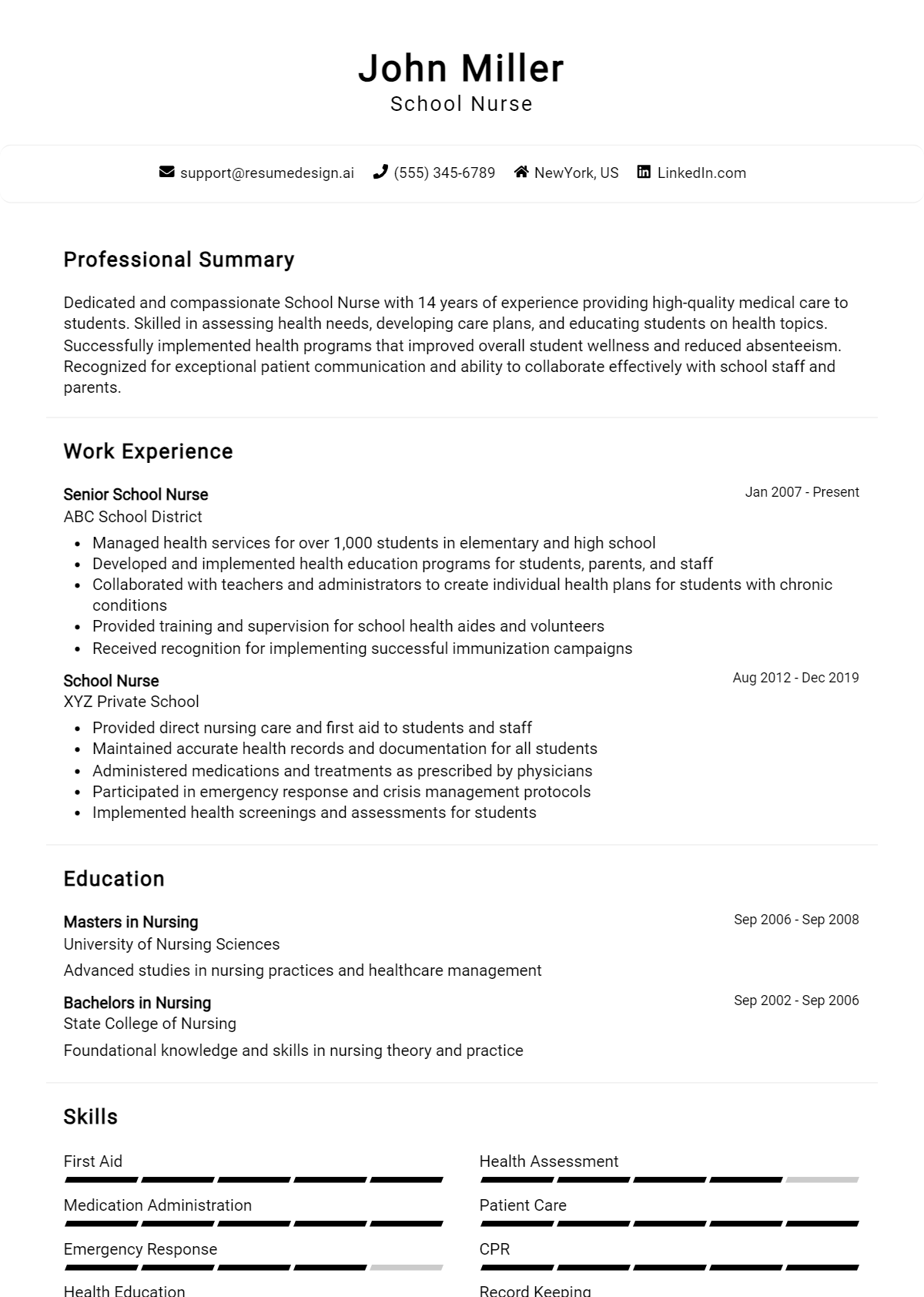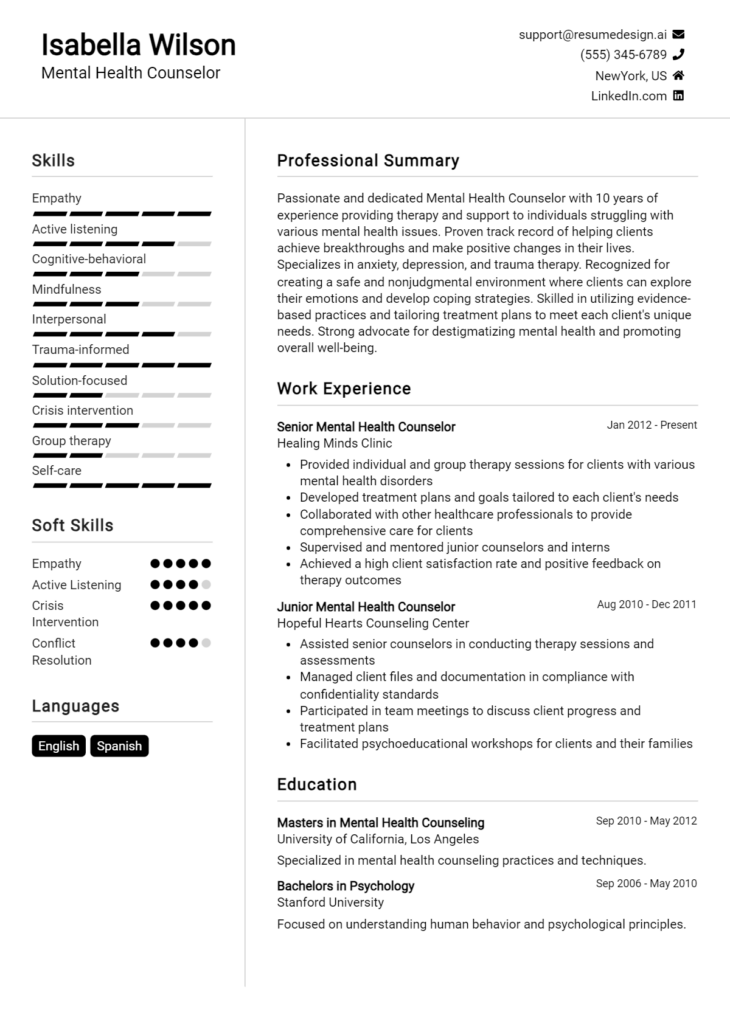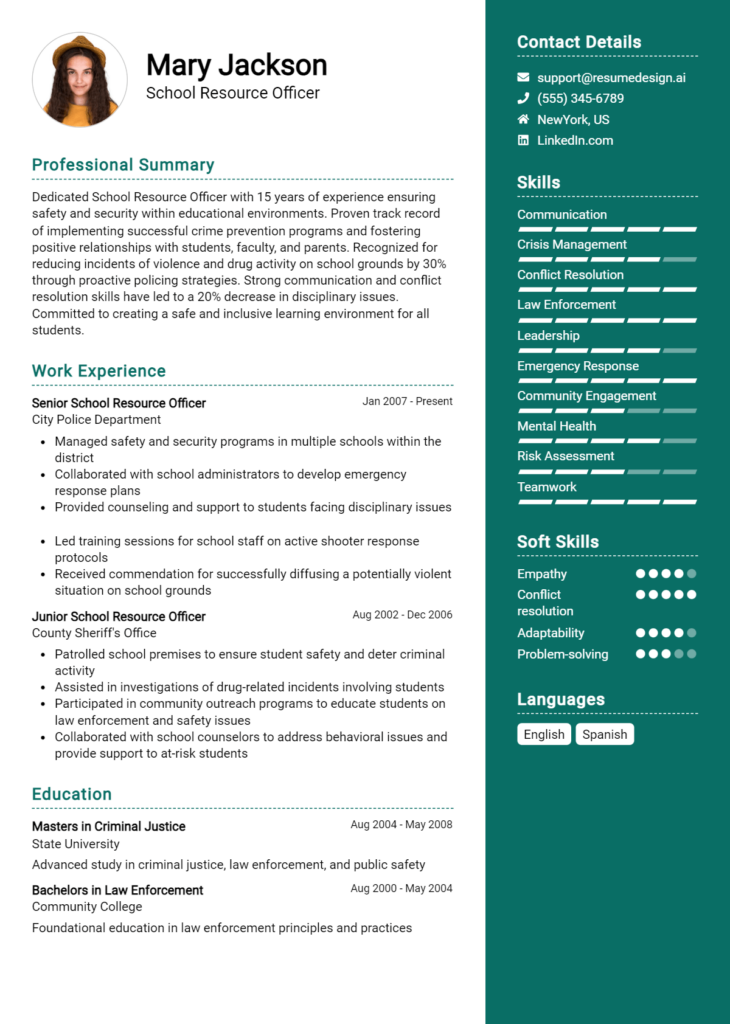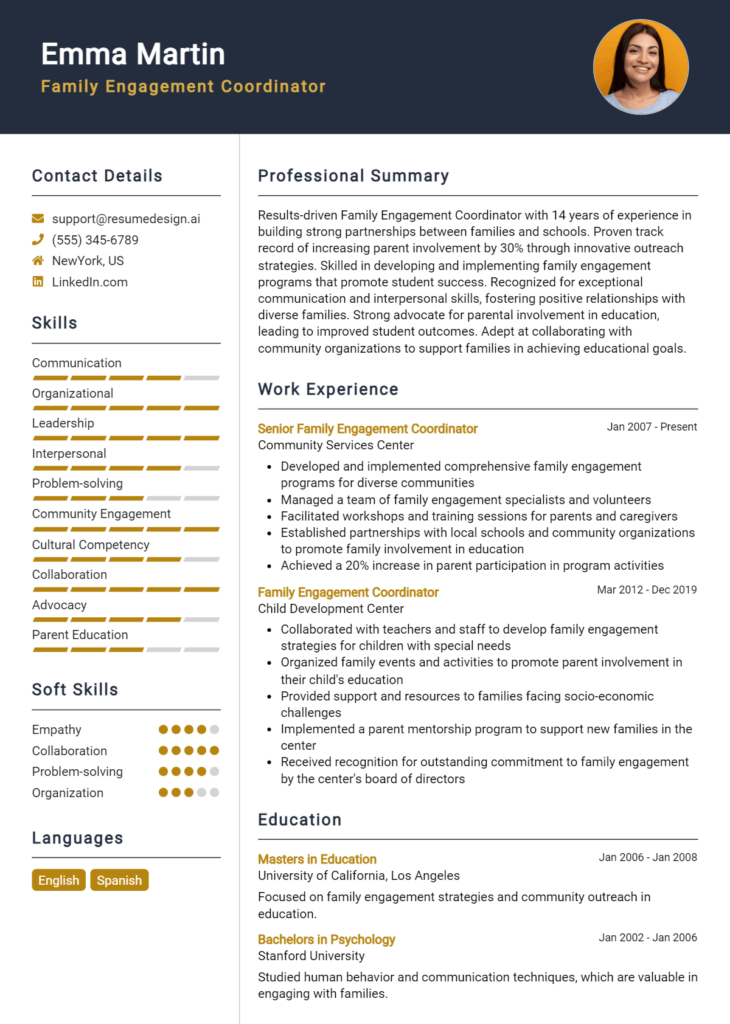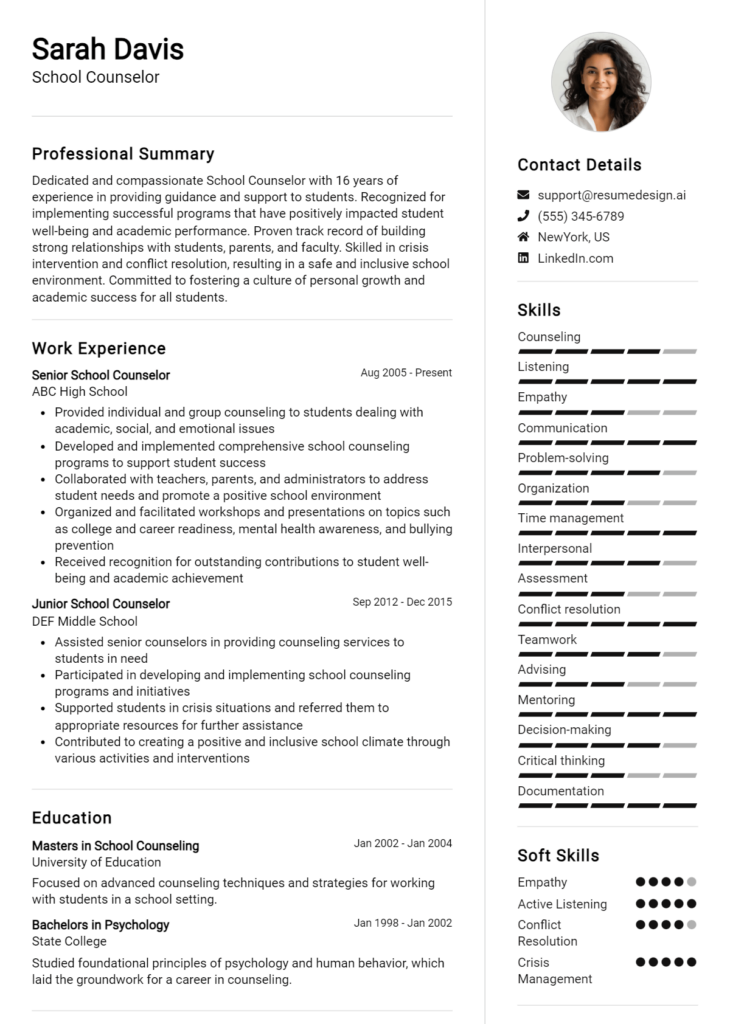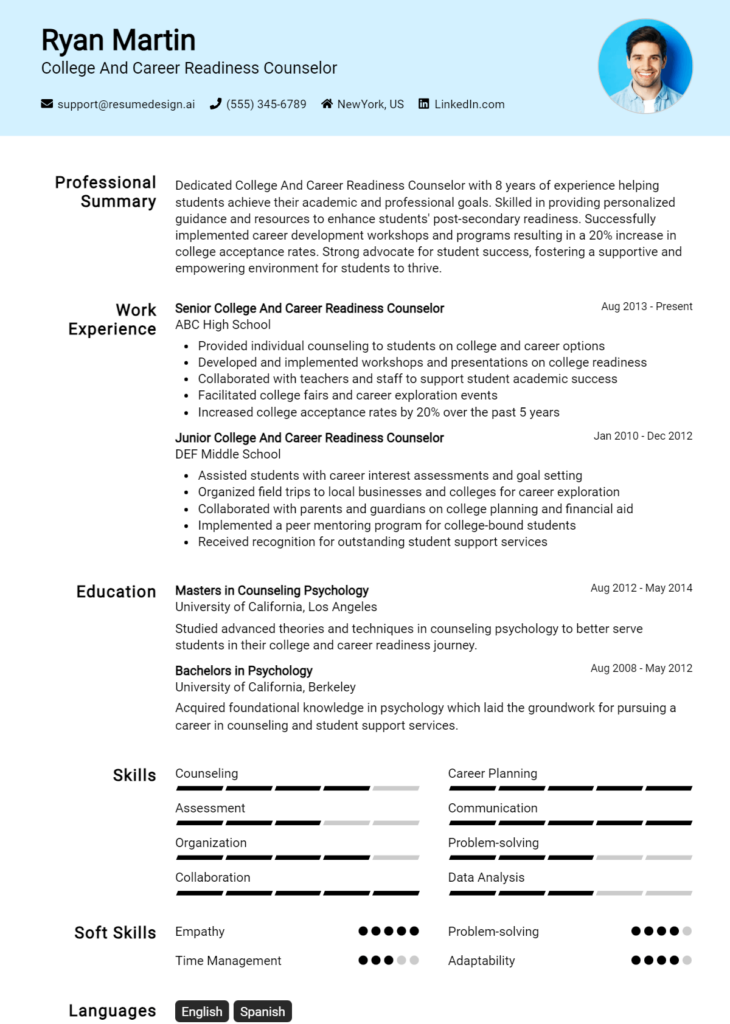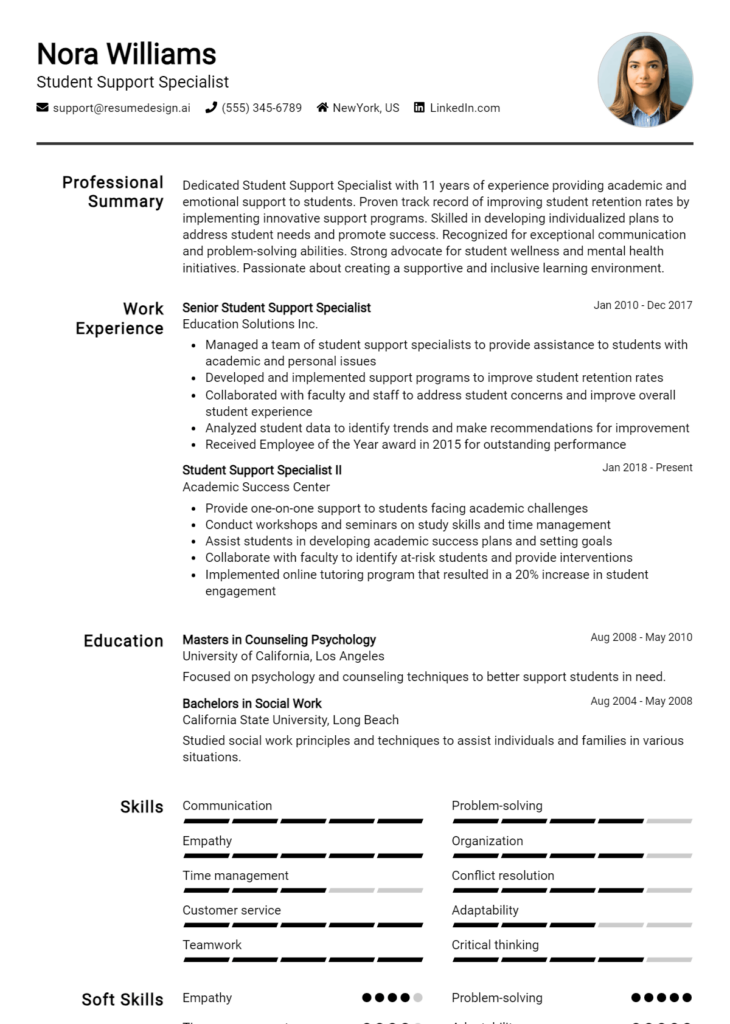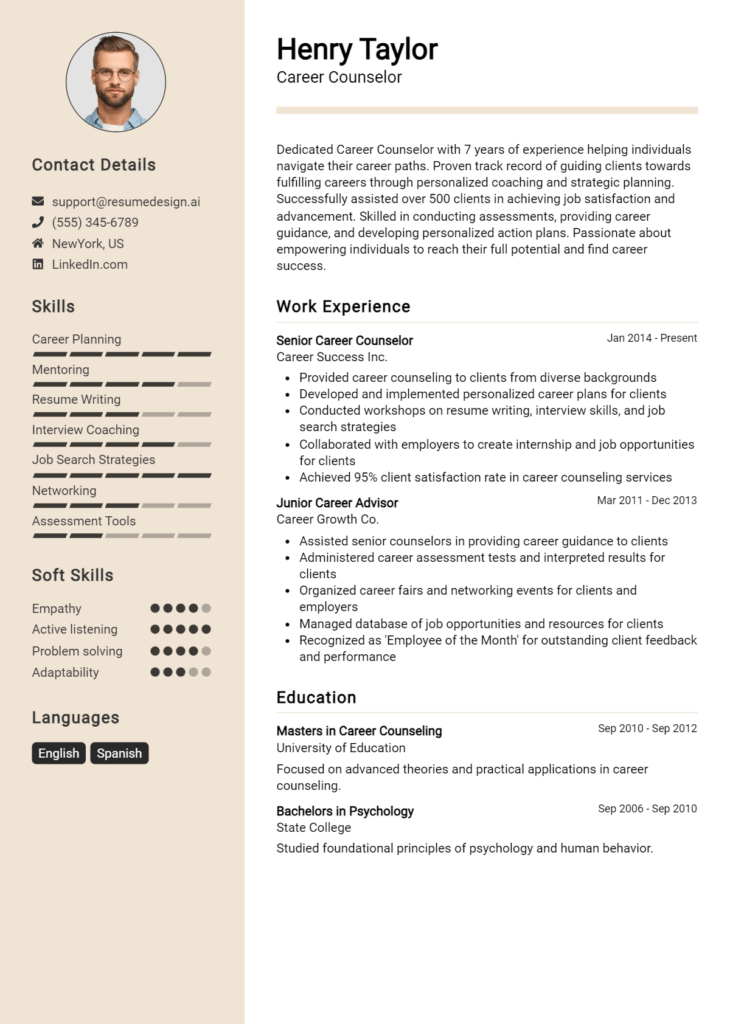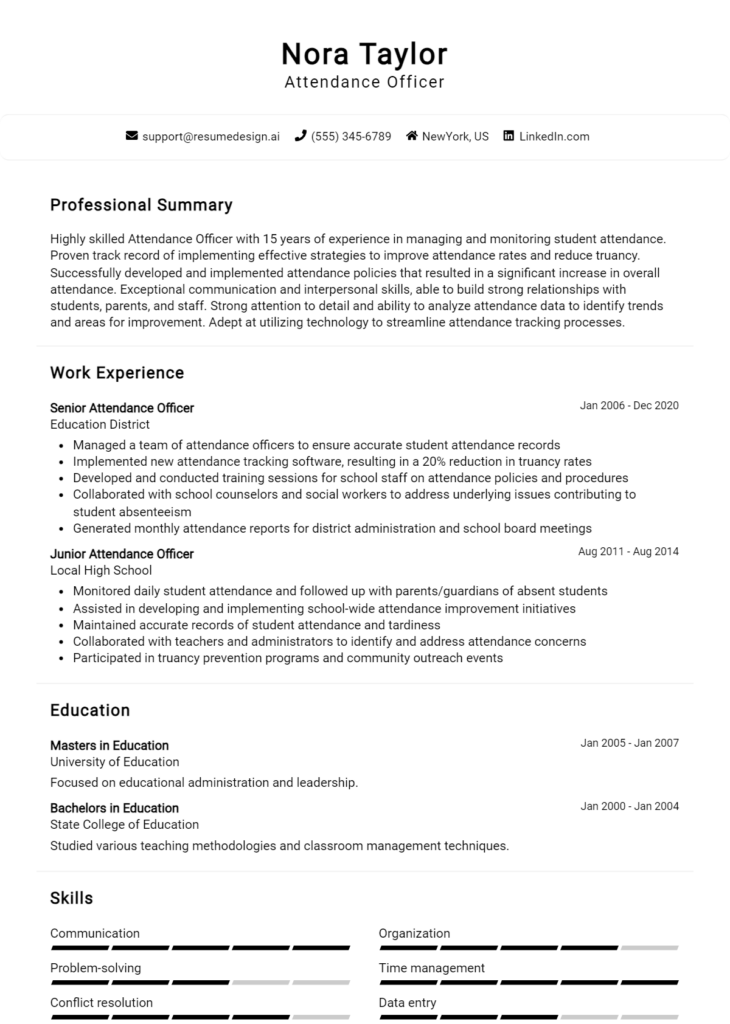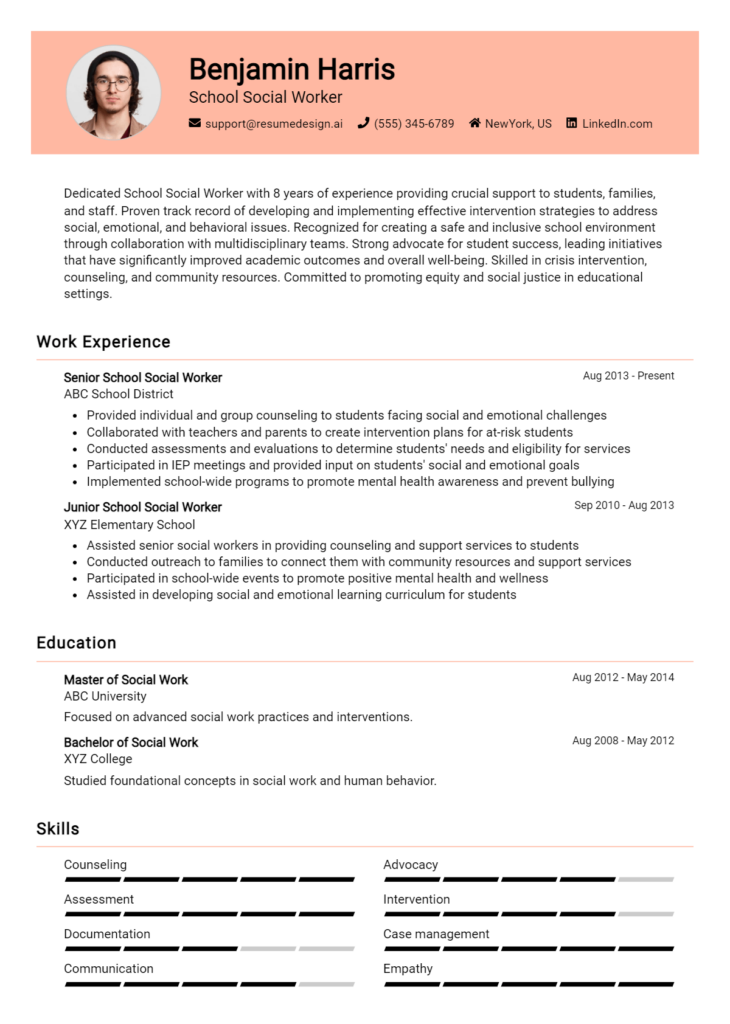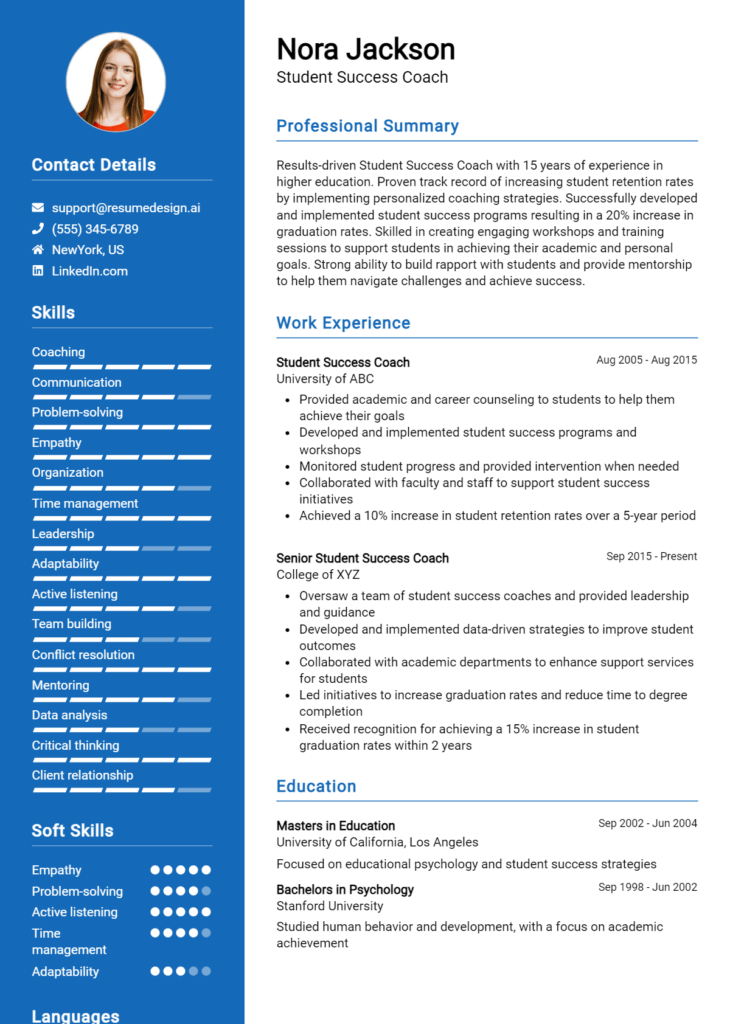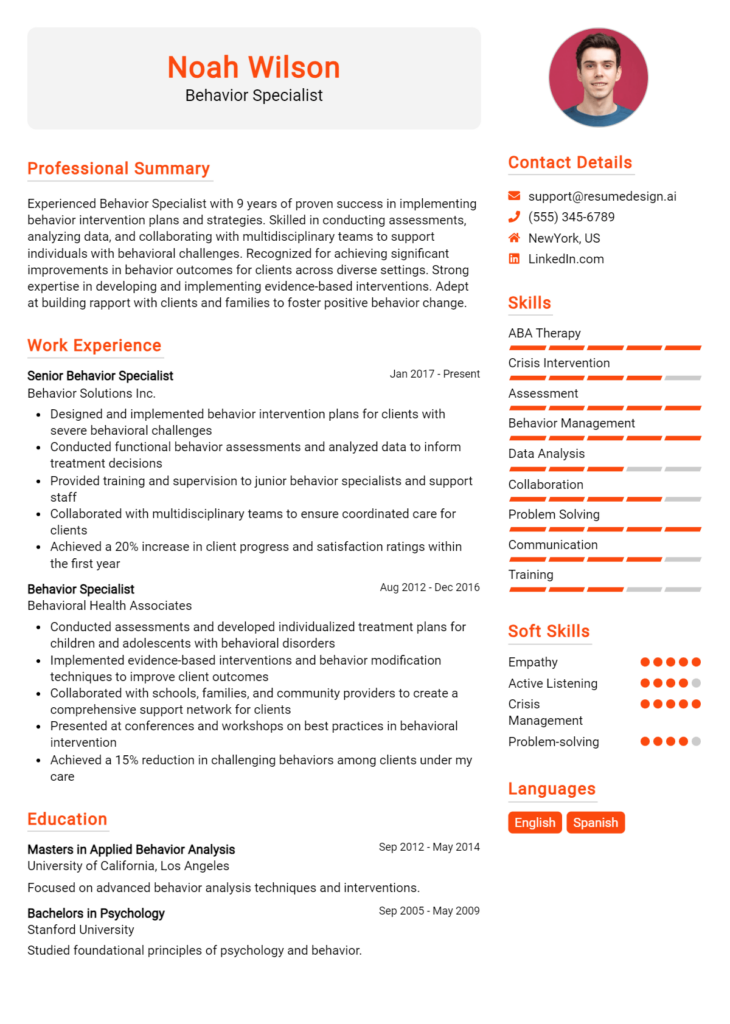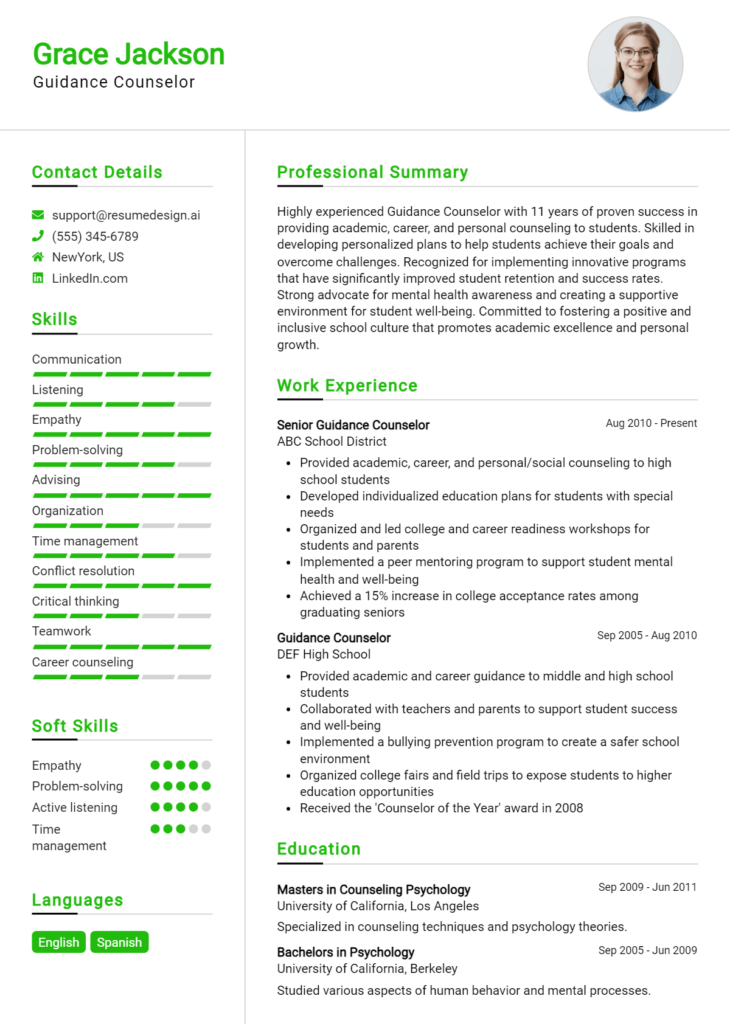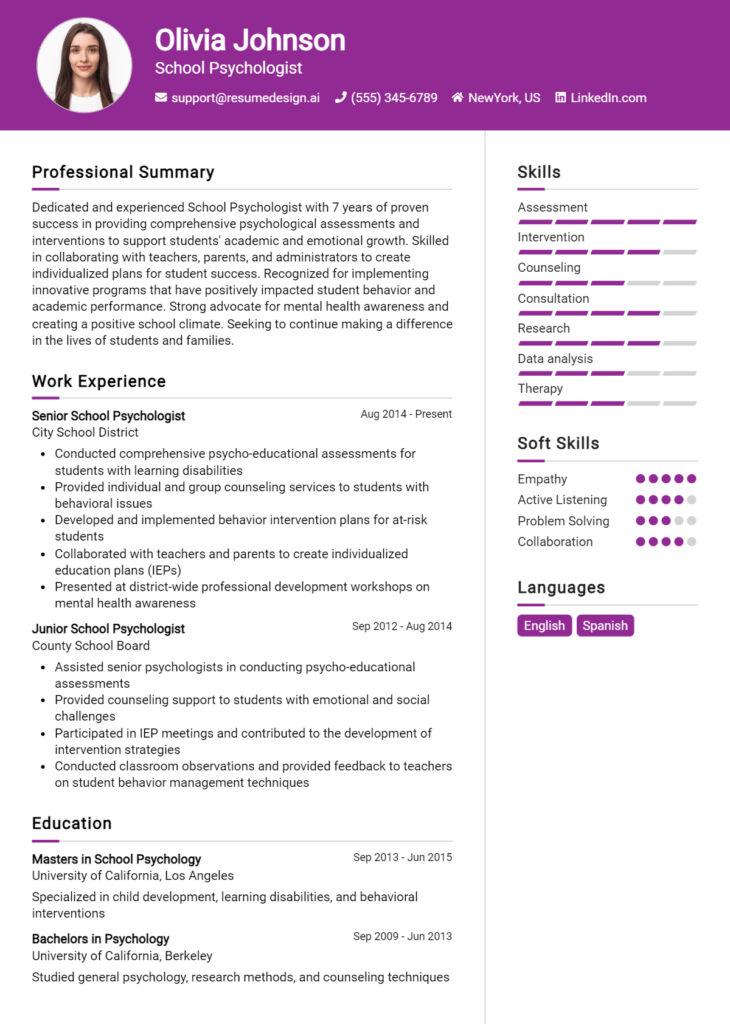School Nurse Core Responsibilities
A School Nurse plays a crucial role in promoting student health and wellbeing within the educational environment. Key responsibilities include assessing student health needs, administering medications, managing chronic conditions, and providing first aid during emergencies. Effective communication and collaboration with teachers, parents, and healthcare providers are essential, bridging various departments to foster a supportive atmosphere. Strong technical, operational, and problem-solving skills are vital for addressing diverse health issues, ultimately contributing to the organization’s goals. A well-structured resume can effectively highlight these qualifications, showcasing the nurse's ability to enhance student health outcomes.
Common Responsibilities Listed on School Nurse Resume
- Conduct health assessments and screenings for students
- Administer medications and manage medical conditions
- Provide first aid and emergency care
- Develop and implement individualized health plans
- Education on health and wellness topics
- Collaborate with school staff and parents
- Maintain health records and documentation
- Ensure compliance with health regulations and policies
- Monitor and manage infectious disease outbreaks
- Advocate for student health needs
- Participate in health and safety committees
- Provide crisis intervention and support services
High-Level Resume Tips for School Nurse Professionals
In the competitive field of school nursing, a well-crafted resume serves as your first opportunity to make a lasting impression on potential employers. This critical document should not only highlight your nursing qualifications but also reflect your unique skills and achievements that align with the demands of a school environment. A compelling resume can set you apart from other candidates, showcasing your ability to provide quality healthcare to students while promoting a safe and supportive educational atmosphere. In this guide, we will offer practical and actionable resume tips specifically tailored for School Nurse professionals, enabling you to present your best self to future employers.
Top Resume Tips for School Nurse Professionals
- Tailor your resume to each job description by incorporating relevant keywords and phrases that align with the role.
- Highlight your nursing credentials, including your degree, certifications, and licenses, prominently at the top of your resume.
- Showcase your clinical experience in school settings or similar environments, emphasizing your understanding of children’s health needs.
- Quantify your achievements by including specific numbers, such as the number of students cared for or health programs implemented.
- Include a dedicated skills section that highlights industry-specific skills, such as first aid, health assessments, and emergency response.
- Demonstrate your communication and collaboration skills by mentioning partnerships with teachers, parents, and community health resources.
- List relevant continuing education courses and professional development activities that keep you updated on best practices in school health.
- Utilize a clean, professional format that enhances readability, making it easy for hiring managers to quickly find key information.
- Incorporate any leadership roles or community involvement that illustrates your commitment to student well-being and health education.
By implementing these resume tips, you can significantly enhance your chances of landing a job in the School Nurse field. A focused and well-organized resume not only showcases your professional qualifications but also conveys your passion for student health and your readiness to contribute positively to the school community. With the right approach, your resume can open doors to fulfilling opportunities in school nursing.
Why Resume Headlines & Titles are Important for School Nurse
In the competitive landscape of school nursing, a well-crafted resume headline or title serves as a crucial first impression for hiring managers. It acts as a powerful summary that encapsulates a candidate's key qualifications and unique selling points in just a few words. A strong headline can immediately grab the attention of decision-makers, making them more likely to explore the resume further. It should be concise, relevant, and directly aligned with the specific job being applied for, effectively communicating the candidate’s expertise and commitment to student health and wellness.
Best Practices for Crafting Resume Headlines for School Nurse
- Keep it concise: Aim for a headline that is brief yet informative.
- Be role-specific: Tailor the headline to reflect the specific responsibilities of a school nurse.
- Highlight key qualifications: Focus on your most relevant skills or certifications.
- Use action words: Incorporate strong verbs that convey your proactive approach to nursing.
- Include relevant keywords: Use terms that are commonly found in school nurse job descriptions.
- Showcase accomplishments: If applicable, mention any notable achievements that set you apart.
- Avoid clichés: Steer clear of overused phrases that lack originality.
- Make it impactful: Ensure your headline leaves a memorable impression on the reader.
Example Resume Headlines for School Nurse
Strong Resume Headlines
Compassionate School Nurse with 5+ Years of Experience in Pediatric Care
Dedicated School Nurse Committed to Enhancing Student Health and Wellness Programs
Certified School Nurse with Expertise in Crisis Management and Health Education
Proven Track Record in Implementing Effective Health Initiatives for Diverse Student Populations
Weak Resume Headlines
Nurse Looking for a Job
Experienced Medical Professional
The strong headlines are effective because they clearly convey the candidates' key strengths, such as their experience, commitment, and specific skills relevant to the role of a school nurse. They are tailored to the job and highlight unique qualifications that can resonate with hiring managers. In contrast, the weak headlines fail to impress due to their vagueness and lack of specificity; they do not provide any insight into the candidate's qualifications or what makes them a suitable fit for the school nursing position, making them easily forgettable.
Writing an Exceptional School Nurse Resume Summary
A well-crafted resume summary is vital for a School Nurse as it serves as the first impression to hiring managers. This concise statement encapsulates the candidate's key skills, relevant experience, and notable accomplishments, effectively capturing attention and encouraging further reading. A strong summary not only highlights qualifications that align with the job but also reflects the candidate's passion for student health and wellness. By tailoring the summary to the specific job application, candidates can significantly enhance their chances of standing out in a competitive job market.
Best Practices for Writing a School Nurse Resume Summary
- Quantify Achievements: Use numbers to demonstrate the impact of your work, such as the number of students served or improvements in health outcomes.
- Focus on Relevant Skills: Highlight key nursing skills such as patient assessment, emergency response, and health education that are pertinent to a school setting.
- Tailor to the Job Description: Customize your summary to reflect the specific requirements and responsibilities mentioned in the job posting.
- Keep it Concise: Aim for 3-5 sentences that clearly communicate your strengths without overwhelming the reader.
- Showcase Professional Experience: Include relevant experience that demonstrates your capability to handle the unique challenges of a school nursing role.
- Highlight Certifications: Mention any specific certifications, such as CPR or first aid training, that enhance your qualifications.
- Use Strong Action Verbs: Start sentences with dynamic verbs to convey your proactive approach and achievements effectively.
- Reflect Soft Skills: Emphasize interpersonal skills, such as communication and empathy, which are crucial for working with students and staff.
Example School Nurse Resume Summaries
Strong Resume Summaries
Compassionate School Nurse with over 5 years of experience providing comprehensive health care services to a diverse student population. Successfully implemented a health education program that improved student awareness of hygiene practices by 40%, resulting in a significant reduction in absenteeism due to illness.
Detail-oriented Registered Nurse with a background in pediatric care and school health advocacy. Managed health assessments for over 800 students, ensuring timely interventions and individualized health plans that boosted overall student health outcomes by 30% within one academic year.
Dedicated School Nurse with a proven track record of creating a safe and healthy school environment. Spearheaded a mental health initiative that increased student participation in counseling services by 50%, positively impacting student well-being and academic performance.
Weak Resume Summaries
Experienced nurse looking for a position in a school. I have worked in various healthcare settings and am good with kids.
School Nurse with some experience in health care. I am interested in helping students and improving their health.
The strong resume summaries are effective because they provide specific outcomes and measurable achievements that clearly demonstrate the candidate's impact in previous roles. They use quantifiable data, relevant skills, and a clear connection to the responsibilities of a School Nurse. In contrast, the weak summaries are too vague, lacking concrete results and failing to convey the candidate's unique qualifications or contributions in a school setting.
Work Experience Section for School Nurse Resume
The work experience section of a School Nurse resume is crucial as it effectively showcases the candidate's technical skills, leadership capabilities, and commitment to delivering high-quality healthcare services within an educational setting. This section allows candidates to present their relevant experiences, demonstrating their proficiency in managing student health, collaborating with educational staff, and implementing health programs. Quantifying achievements, such as improving student health outcomes or increasing compliance with health regulations, and aligning experiences with industry standards is essential to highlight the candidate's impact and suitability for the role.
Best Practices for School Nurse Work Experience
- Highlight specific technical skills relevant to school nursing, such as first aid, immunizations, and health assessments.
- Quantify achievements with measurable outcomes, such as the percentage increase in student health screenings or successful implementation of health programs.
- Emphasize collaboration with teachers, parents, and healthcare providers to showcase teamwork and communication skills.
- Detail leadership roles in managing health initiatives or mentoring other healthcare staff.
- Include any certifications or specialized training that enhances technical expertise.
- Use action verbs to convey proactive involvement in student health and wellness.
- Align experiences with current industry standards and best practices in school health services.
- Tailor work experience descriptions to match the specific requirements of the job posting.
Example Work Experiences for School Nurse
Strong Experiences
- Implemented a school-wide health screening program that increased participation by 40%, resulting in early detection of health issues among students.
- Led a team of health professionals in developing and executing a mental health awareness campaign, achieving a 30% increase in students seeking counseling services.
- Collaborated with local health departments to coordinate vaccination clinics, successfully immunizing over 500 students within a single semester.
- Trained and mentored new nursing staff on best practices in school health, improving service delivery and reducing incident reports by 25%.
Weak Experiences
- Assisted in providing health services to students.
- Participated in various health-related activities at the school.
- Helped with paperwork and other tasks in the health office.
- Worked with students to address health issues.
The examples listed as strong are considered effective because they clearly demonstrate quantifiable outcomes, leadership, and collaboration, indicating a direct impact on the health and wellness of the school community. In contrast, the weak experiences lack specificity and measurable results, making them less impactful and failing to convey a strong sense of the candidate's contributions or skills in the role of a School Nurse.
Education and Certifications Section for School Nurse Resume
The education and certifications section of a School Nurse resume is crucial as it showcases the candidate's academic background, relevant certifications, and ongoing professional development. This section not only highlights the foundational knowledge and skills acquired through formal education but also emphasizes the candidate's commitment to continuous learning and staying updated with industry standards. By providing details on relevant coursework, certifications, and specialized training, candidates can significantly enhance their credibility and demonstrate their alignment with the specific requirements of the school nurse role.
Best Practices for School Nurse Education and Certifications
- Include a clear and concise list of relevant degrees, such as a Bachelor of Science in Nursing (BSN) or an Associate Degree in Nursing (ADN).
- Highlight industry-recognized certifications, such as Certified School Nurse (CSN) or Pediatric Advanced Life Support (PALS).
- Detail any specialized training or workshops related to school health, mental health, or emergency response.
- Provide the dates of completion for degrees and certifications to showcase your recent educational efforts.
- Focus on continuing education units (CEUs) or professional development courses that enhance your nursing skills in a school setting.
- Use bullet points for clarity and organization, ensuring each item is easily readable and accessible.
- Order the information chronologically or by relevance, placing the most pertinent qualifications at the top.
- Tailor the section to align with the specific job description, emphasizing coursework and certifications that directly relate to the school nursing role.
Example Education and Certifications for School Nurse
Strong Examples
- Bachelor of Science in Nursing (BSN), XYZ University, 2015
- Certified School Nurse (CSN), National Association of School Nurses, 2020
- Pediatric Advanced Life Support (PALS), American Heart Association, 2022
- Coursework in Child Development and School Health, XYZ University, 2014
Weak Examples
- Associate Degree in Nursing (ADN), Unaccredited College, 2010
- Basic Life Support (BLS), Expired Certification, 2019
- High School Diploma, 2005
- Certification in Medical Billing, 2018
The strong examples are considered effective as they directly relate to the qualifications and skills needed for a school nursing position, showcasing relevant education and up-to-date certifications that reflect a commitment to the field. In contrast, the weak examples fail to demonstrate relevance to school nursing, include outdated or expired certifications, and highlight educational qualifications that do not align with the role, thereby diminishing the candidate's credibility.
Top Skills & Keywords for School Nurse Resume
As a School Nurse, possessing a well-rounded set of skills is crucial not only for the effective delivery of healthcare services to students but also for fostering a safe and supportive environment. A comprehensive resume that highlights both hard and soft skills can significantly enhance your candidacy, showcasing your capability to handle diverse challenges in a school setting. Skills such as communication, empathy, and critical thinking are vital for interacting with students, parents, and staff, while technical proficiencies in health assessments and emergency response are equally important. Emphasizing these skills in your resume can significantly improve your chances of securing a position as a School Nurse.
Top Hard & Soft Skills for School Nurse
Soft Skills
- Empathy
- Communication
- Active Listening
- Problem-Solving
- Teamwork
- Adaptability
- Time Management
- Conflict Resolution
- Patience
- Cultural Competence
- Attention to Detail
- Leadership
- Emotional Intelligence
- Stress Management
- Advocacy
Hard Skills
- Health Assessment
- First Aid and CPR
- Medication Administration
- Knowledge of Pediatric Health Issues
- Record Keeping and Documentation
- Familiarity with Health Regulations
- Emergency Response Planning
- Immunization Protocols
- Basic Life Support (BLS)
- Knowledge of Mental Health Resources
- Nutrition and Health Education
- Use of Medical Equipment
- Infectious Disease Control
- Data Analysis for Health Trends
- Health Promotion Strategies
For more insights on enhancing your resume, explore additional skills and work experience tips.
Stand Out with a Winning School Nurse Cover Letter
Dear [Hiring Manager's Name],
I am writing to express my interest in the School Nurse position at [School Name] as advertised on [where you found the job listing]. With a Bachelor’s degree in Nursing and over [X years] of experience in pediatric healthcare, I am confident in my ability to provide exceptional care and support to the students at your institution. My background includes working in both clinical settings and school environments, where I have honed my skills in health assessments, emergency response, and health education, all while fostering a nurturing and safe atmosphere for children.
In my previous role at [Previous School or Organization], I successfully implemented health programs that educated students and staff about common health issues, nutrition, and hygiene practices. I collaborated closely with teachers and parents to create individualized care plans for students with chronic illnesses, ensuring that their needs were met while they thrived in a learning environment. My ability to communicate effectively with children and their families has always been a cornerstone of my practice, allowing me to build trust and rapport that encourages students to take an active role in their health and wellness.
I am particularly impressed by [School Name]'s commitment to holistic student well-being and am eager to contribute to your initiatives aimed at promoting physical and mental health among students. I am skilled in using various health technologies and maintaining accurate health records, which is crucial in managing the health needs of a diverse student body. My proactive approach to identifying potential health risks and providing timely interventions aligns with your school's mission to create a healthy learning environment.
Thank you for considering my application. I am looking forward to the opportunity to discuss how my experience and passion for school nursing can contribute positively to the health and well-being of your students. I hope to bring my expertise in pediatric care and my dedication to fostering a supportive school community to [School Name].
Sincerely,
[Your Name]
[Your Contact Information]
Common Mistakes to Avoid in a School Nurse Resume
When crafting a resume for a school nurse position, it's crucial to present your qualifications and experiences effectively. Many candidates make avoidable mistakes that can hinder their chances of landing an interview. Understanding these common pitfalls can help you create a more compelling and professional resume that stands out to hiring managers in the educational sector.
Neglecting Relevant Certifications: Failing to highlight essential certifications such as CPR, First Aid, or a valid nursing license can leave hiring managers questioning your qualifications.
Using Generic Descriptions: Generic job descriptions or responsibilities may not showcase your unique skills. Tailor your experience to reflect specific roles and tasks that align with school nursing.
Omitting Quantifiable Achievements: Not including measurable outcomes, such as improvements in student health metrics or successful implementation of health programs, can make your contributions seem less impactful.
Lack of Clarity and Organization: A cluttered or poorly organized resume can make it difficult for recruiters to quickly assess your qualifications. Use clear headings, bullet points, and concise language to improve readability.
Including Irrelevant Work Experience: Listing unrelated work experiences can dilute your focus. Highlight only those positions that demonstrate relevant nursing skills or experience in an educational setting.
Ignoring the Cover Letter: A strong resume paired with a well-crafted cover letter can significantly enhance your application. Neglecting to include a cover letter may cause you to miss the opportunity to explain your passion for school nursing.
Inconsistent Formatting: Inconsistent font styles, sizes, or spacing can create a disjointed appearance. Maintain uniform formatting throughout your resume to project professionalism.
Failing to Proofread: Typos and grammatical errors can undermine your credibility. Thoroughly proofread your resume to ensure it is polished and free from mistakes.
Conclusion
As a School Nurse, your role is pivotal in ensuring the health and well-being of students, promoting a safe learning environment, and serving as a vital link between education and health care. Throughout this article, we've explored the essential skills and responsibilities that define this position, highlighting the importance of effective communication, health assessments, and emergency response.
To excel in this field, a well-crafted resume is crucial. It should reflect your qualifications, experience, and the unique contributions you can make to a school community. We encourage you to take a moment to review and update your School Nurse Resume, ensuring it showcases your strengths and aligns with the demands of the role.
To assist you in this process, consider utilizing resources such as resume templates, which can provide a professional format to highlight your skills effectively. For a more personalized touch, explore the resume builder that allows you to create a standout resume tailored to your career path. Additionally, reviewing resume examples can inspire you and give you insights into how to present your experience. Finally, don't forget about the importance of a compelling introduction; check out cover letter templates to craft a strong first impression.
Take action today to enhance your professional materials and position yourself as a competitive candidate for the impactful role of School Nurse!

